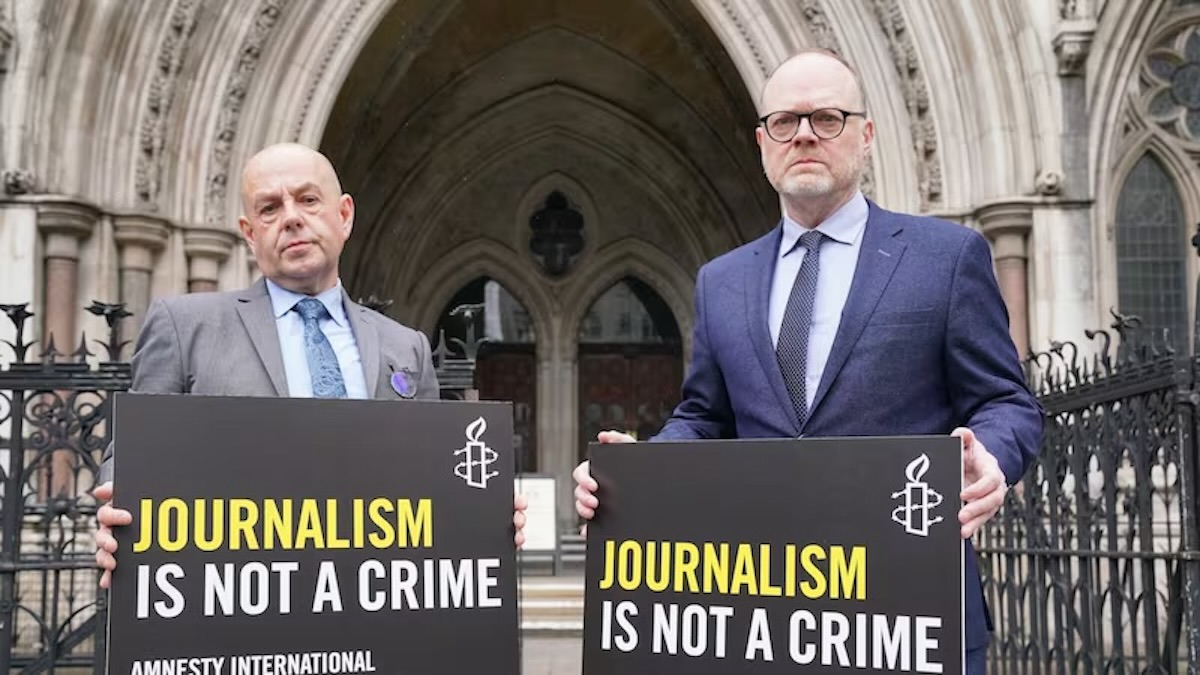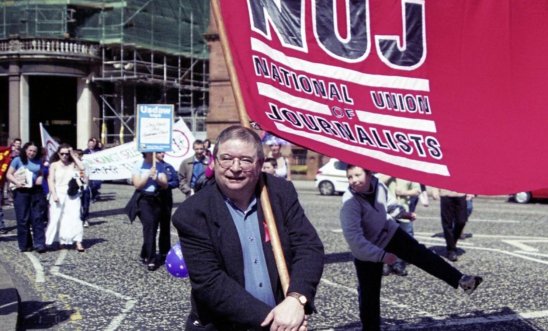
A tribunal in London has heard that a senior PSNI figure adhered to a sectarian conspiracy theory that judicial decisions against the force were due to Catholics in the court system.
The allegation is contained in newly disclosed documents before the Investigatory Powers Tribunal (IPT) in London which is looking at the legality of the PSNI’s secret monitoring of what the force has described as “troublemaker” journalists and lawyers.
The case has been brought by journalists Barry McCaffrey and Trevor Birney (pictured) who were arrested over the suspected “theft” of information held by the Police Ombudsman’s Office in 2018.
They were working on a documentary about the murder of six Catholic men who were shot dead by loyalist gunmen, in evident collusion with the Crown Forces, as they watched a World Cup match in Loughinisland in 1994.
Mr Birney and Mr McCaffrey later won a court case which found the warrants used to search their homes had been “inappropriate”.
The judge said they had acted properly in protecting their sources in a lawful way and the PSNI paid out substantial damages.
It was revealed in an email that Darren Ellis, a former police officer from Durham Constabulary, who led an investigation into the alleged “theft”, had been told by a senior PSNI figure to “exercise caution when dealing with solicitors, barristers and members of the judiciary given the disproportionate representation of those from a Roman Catholic background”.
He was told that Catholics pursuing a legal profession “were, more often than not, uncomfortable in joining the police”.
He also revealed the senior PSNI officer believed there was “perverse decision making” within criminal justice processes “by those of a religious and political persuasion, given the prevalence of those from a Catholic background within the Northern Ireland courts system”.
In his evidence on Wednesday, Ellis denied he had referred to the the two journalists as “criminals” and “thieves” in a phone call to the office of an MP who had appeared in a photograph with Mr McCaffrey and Mr Birney.
He described his investigation to find out how the ‘secret’ information had appeared in the documentary was a “search for the truth”.
The inquiry also heard on Wednesday that in an email to the IPT ahead of his appearance Mr Ellis shockingly wrote “the applicants and their legal teams operate in a community where no-one ever holds them to account”.
That allowed them to “ride roughshod over people who ‘dare’ challenge them,” he believed.
“For too long they shout and they brawl and intimidate others. I consider it to be a strategy to frighten and softly intimidate and hence place a ring of steel around corrupt activity.”
Stephen Toal KC representing Trevor Birney, said Mr Ellis had shown animosity towards the journalists and had “lost all objectivity in the course of this investigation”.
Addressing Mr Ellis, the lawyer said: “You asked what the difference was between a tenacious, professional and caring investigator and a belligerent one.”
“Can I suggest to you the answer is honesty and integrity. You’ve lied at every opportunity.”
The hearing is scheduled to end on Friday with the panel of three judges providing a written judgement at a later date.
Sinn Féin MP Chris Hazzard, who was is in London to lend his support to the journalists, described the case as “yet another shocking example of the lengths that police and state bodies have gone to deny families truth and justice, and instead have sought to criminalise journalists for doing their job.
“It is not lost on the people of South Down that the time, effort and resources deployed by the British state to suppress investigatory journalists stands in stark contrast to the abysmal failure to investigate the murder of six men watching a football match in Loughinisland in 1994.”
ANNIVERSARY OF MURDERED JOURNALIST

Meanwhile, on the anniversary of the murder, the British government has also been pressed to hold an independent inquiry into the killing of journalist Martin O’Hagan.
Mr O’Hagan was assassinated by loyalist paramilitaries in Lurgan, County Armagh in 2001. No one has ever been convicted of his murder.
The National Union of Journalists (NUJ) assistant general secretary Seamus Dooley said there are many unanswered questions and issues to be resolved around the murder of Mr O’Hagan, including suspicions of PSNI collusion.
“The murder of Martin O’Hagan was a watershed moment for journalism in the UK and Ireland. The failure to properly investigate it has cast a long shadow and continues to embolden those who seek to silence journalists,” he said.
Patrick Corrigan, Amnesty International’s Northern Ireland director, said Mr O’Hagan’s killing was “designed to send a clear message to journalists in Northern Ireland that they are not safe”.
“It is simply unacceptable that, in the 23 years since Martin O’Hagan was shot dead, not a single person has been held accountable,” he said.
“This failure has created an environment of impunity for those who continue to threaten journalists in Northern Ireland today.
“It is notable that, in 2024, threats of serious violence continue to be directed at journalists from the very same sort of armed groups which killed Martin O’Hagan.
“We support calls from the National Union of Journalists for a fresh investigation into the killing. Press freedom must be resolutely defended.”
![[Irish Republican News]](https://republican-news.org/graphics/title_gifs/rn.gif)
![[Irish Republican News]](https://republican-news.org/graphics/title_gifs/harp.gif)

